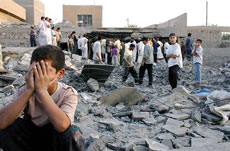|
US Backtracks on Iraq Reconstruction: Report
 |
|
Bush
had said the ultimate aim is for the Iraqi infrastructure "to
be the best in the region".
|
CAIRO,
January 2, 2006 (IslamOnline.net) – The Bush administration has
apparently backtracked on its promises to rebuild Iraq, and does not
intend to seek any funds for the gruesome job in the budget request
going before Congress in February, a leading US daily reported on
Monday, January 2.
"When
the last of the $18.4 billion is spent, other foreign donors and the
fledgling Iraqi government will have to take up what authorities say
is tens of billions of dollars of work yet to be done merely to bring
reliable electricity, water and other services to Iraq's 26 million
people," The Washington Post quoted administration
officials as making clear.
The
decision signals the winding down of an $18.4 billion US rebuilding
effort in which roughly half of the money was eaten away by fighting
the Iraqi resistance, a buildup of Iraq's criminal justice system and
the investigation and trial of ousted president Saddam Hussein, said
the mass-circulation daily.
It
further quoted Brig. Gen. William McCoy, the Army Corps of Engineers
commander overseeing the Iraq reconstruction mission, as telling
reporters in Baghdad recently that "the US never intended to
completely rebuild Iraq".
"Worst
Builders"
The
Post quoted Zaid Saleem 26, who works
at a market in Baghdad, as saying the Americans "are the best in
destroying things but they are the worst in rebuilding."
Mustafa
Sidqi Murthada, owner of a men's clothing store in Baghdad, echoed
similar sentiments.
"It
is easy for the Americans to say, 'We are doing reconstruction in
Iraq,' and we hear that. But to make us believe it, they should show
us where this reconstruction is," he told the American daily.
"Maybe
they are doing this reconstruction for them in the Green Zone. But
this is not for the Iraqis."
The
Green Zone is Baghdad's most fortified compound and hosts the
headquarters of the US-led occupation forces, the US-backed Iraqi
government as well as the American and British embassies.
Over
8 billion dollars of money that was supposed to be spent on rebuilding
war-scattered Iraq under the US-led Coalition Provisional Authority
(CPA) disappeared by the time Paul Bremer left his post as head of the
authority.
Calling
it the ‘extraordinary scandal of Iraq's missing billions’,
Britain's The Guardian said in July 2004, that Bremer
maintained one slush fund of nearly $600m in cash for which there is
no paperwork: $200m of it was kept in a room in one of Saddam's former
palaces.
Prewar
Levels
 |
|
An
Iraqi told the US daily the Americans " are the best in
destroying things but they are the worst in rebuilding."
|
The
Post report
drew a bleak picture of the infrastructure in the war-torn country,
showing most basic services to be way below the levels before US tanks
rolled into Baghdad on April 9, 2003.
In
two of the most crucial areas, electricity and oil production, output
remains at or below prewar levels despite the expenditure of hundreds
of millions of American dollars and countless man-hours, the paper
said.
Oil
production stands at roughly 2 billion barrels a day, compared with
2.6 billion before US troops entered Iraq in March 2003, according to
US government statistics.
The
national electrical grid has an average daily output of 4,000
megawatts, about 400 megawatts less than its prewar level.
"Iraqis
nationwide receive on average less than 12 hours of power a day,"
said the daily.
For
residents of Baghdad, it was six hours a day last month, according to
a US count, though many residents say that figure is high.
This
is a sharp contradiction to statements by senior US officials,
including President George W. Bush himself.
"In
a lot of places, the infrastructure is as good as it was at prewar
levels, which is satisfactory, but it's not the ultimate aim. The
ultimate aim is for the infrastructure to be the best in the
region," Bush said in August 2003.
Since
the reconstruction effort began in 2003, midcourse changes by US
officials have shifted at least $2.5 billion from the rebuilding of
Iraq's decrepit electrical, education, water, sewage, sanitation and
oil networks to build new security forces and to construct a
nationwide system of security prisons and detention centers, according
to The Post.
The
investigation and trial of Saddam also ate a big chunk of money
allocated originally for the reconstruction of Iraq, it added.
A
US congressional report issued last October said the everyday live of
the Iraqi people has not improved much under the US-led
invasion-turned-occupation of the oil-rich Arab country.
"It
is unclear how US efforts are helping the Iraqi people obtain clean
water, reliable electricity or competent health care," said the
report presented by the US Government Accountability Office (GAO) to
Congress.
A
report by the Washington Post last August also revealed the
Bush administration scaling down its "unrealistic" goals
regarding what can be achieved in Iraq.
You
May Read Also…
|